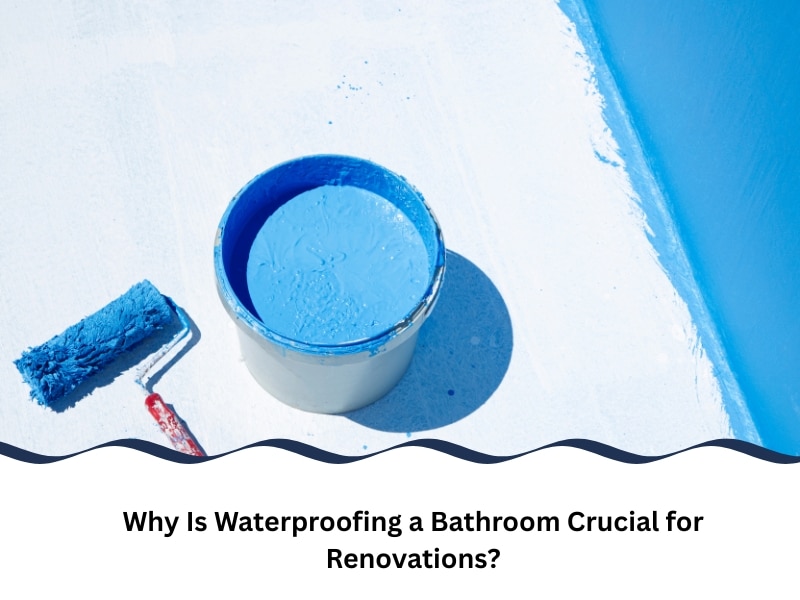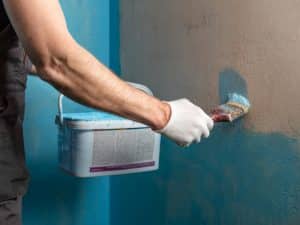When renovating your bathroom, waterproofing should always be a top priority. It’s an essential step in protecting your home and investment. Properly waterproofing a bathroom ensures that the space remains safe, functional, and visually appealing for years to come. Neglecting this important step can lead to significant long-term issues, including water damage, mould, and structural degradation. This article will explore why waterproofing is crucial during bathroom renovations and how it can benefit you in both the short and long term.
How does waterproofing prevent water damage in bathrooms?
Waterproofing your bathroom prevents water from seeping into unwanted areas. Bathrooms are constantly exposed to moisture due to showers, baths, and sink usage. When water penetrates through walls or floors, it can cause significant damage to the structure of your home. This can lead to issues such as:
- Mould growth: Damp conditions promote the development of mould, which can affect your health and damage the walls and floors.
- Structural damage: Prolonged exposure to water can weaken the foundation, causing wood to rot, metal to rust, and concrete to degrade.
- Costly repairs: Without proper waterproofing, you may need expensive repairs to fix water damage to your plumbing, walls, and floors.
- Paint peeling and wallpaper damage: Water can cause your paint or wallpaper to peel, requiring costly touch-ups or replacements.
Applying a waterproofing layer ensures that moisture stays where it belongs—within your shower or bath area, protecting the integrity of your bathroom and your home.
What are the risks of not waterproofing a bathroom during renovation?
Not waterproofing your bathroom during renovations can have several serious consequences. Water can easily penetrate walls, floors, and other areas, leading to both immediate and long-term damage. Here are some risks you face when skipping this crucial step:
Issue | Impact | Consequence |
Mould growth | Moisture seepage | Ideal environment for mould |
Rot and decay | Timber/material damage | Structural integrity risk |
Increased repair costs | Water damage | Expensive repairs needed |
Health risks | Mould exposure | Respiratory issues |
Decreased property value | Water damage | Lower resale potential |
Failing to properly waterproof your bathroom is one of the common challenges to avoid during a bathroom renovation. It leaves the space vulnerable to mould, structural damage, and unpleasant odours, making it risky.
Can waterproofing improve the longevity of bathroom renovations?
Waterproofing your bathroom plays a major role in extending the life of your renovations. By creating a protective barrier against moisture, you reduce the likelihood of damage that could shorten the lifespan of your bathroom. Here’s how waterproofing contributes to longevity:
- Prevents premature wear and tear: Waterproofing stops moisture from affecting surfaces, ensuring your bathroom tiles, grout, and fittings stay in good condition for longer.
- Reduces the need for repairs: Waterproofing minimises the likelihood of costly repairs by preventing water from damaging the walls and flooring.
- Maintains aesthetic appeal: Waterproofing keeps your bathroom fresh by preventing discolouration, mildew stains, or watermarks on tiles and paint.
- Improves material durability: Waterproofed materials, such as timber and drywall, are more resistant to the effects of water exposure, prolonging their lifespan.
Waterproofing helps your bathroom stay in top condition for years, reducing maintenance costs and preserving your investment.
When should waterproofing be done in the renovation timeline?
Timing is everything when it comes to waterproofing your bathroom. It must be done at the right point in the renovation process to be effective. Here’s when waterproofing should occur:
- After plumbing and electrical installations: All plumbing and electrical work must be completed before waterproofing to prevent the waterproofing layer from being disrupted later.
- Before tiling: Waterproofing should be applied to the floors and walls before you install tiles. This ensures that the waterproofing layer is well protected beneath your tiles.
- After surface preparation: The surfaces should be thoroughly cleaned and prepped before applying the waterproofing membrane, ensuring proper adhesion and effectiveness.
- Before sealing and grouting: Once the waterproofing layer has cured, the bathroom can be sealed and grouted.
Correctly timing the waterproofing process ensures its effectiveness and protects your renovation investments.
How does bathroom waterproofing improve safety?
Waterproofing your bathroom also plays a critical role in improving the safety of the space. Here’s how:
- Prevents slippery surfaces: Waterproofing reduces the risk of water pooling on the floor, which can cause slippery surfaces and accidental falls.
- Reduces electrical hazards: Moisture near electrical outlets can increase the risk of short circuits and electric shocks. Waterproofing keeps water away from vulnerable areas.
- Protects from mould and bacteria: Mould and mildew can cause respiratory issues, especially those with allergies or asthma. Waterproofing prevents their growth.
- Keeps the bathroom dry: By preventing leaks, waterproofing helps maintain dry surfaces, which helps avoid moisture-related accidents.
Waterproofing adds a layer of safety by reducing the risks of slips, electrical hazards, and mould growth in bathrooms.
How can waterproofing prevent costly long-term damage?
Waterproofing your bathroom is a wise investment that prevents major repairs and costs. Here’s how it saves you money in the long run:
- Prevents foundation damage: Water infiltration can weaken your bathroom’s foundation, leading to structural damage. This emphasises the vital role of waterproofing to prevent damage in wet areas, safeguarding your bathroom from such issues.
- Stops water leaks: Leaking water can damage your ceiling, walls, and floors, leading to expensive repairs. Waterproofing prevents this.
- Avoids water-related diseases: Damp environments encourage bacteria and mould, which can cause health problems and require costly clean-up efforts.
- Saves on maintenance: Waterproofing reduces the need for frequent touch-ups or repairs caused by water damage.
Waterproofing prevents costly long-term damage by protecting your bathroom’s structure and preventing leaks, water damage, and health risks.
Can you waterproof a bathroom yourself?
While it may seem straightforward, waterproofing a bathroom is a technical process that requires the right materials, knowledge, and skill to be done effectively. That’s why it’s vital to consider reliable bathroom waterproofing solutions when planning your bathroom renovations. Getting it right the first time can help avoid issues like uneven application or incomplete coverage.
- Expertise: Professional waterproofers have the knowledge and experience to apply waterproofing materials correctly.
- Tools and equipment: Proper waterproofing requires specialised tools, which professionals can access.
- Long-term durability: A professional job ensures that the waterproofing lasts for years without issues.
- Warranty: Many professional services offer warranties on their waterproofing work, giving you peace of mind.
DIY waterproofing can be tempting, but it’s crucial to get it done right the first time to avoid future headaches.
Conclusion
Waterproofing a bathroom during renovations is a crucial step that ensures the longevity and safety of your bathroom. It protects against water damage, improves safety, and can save you money in the long run by preventing costly repairs. When undertaking a renovation, always make waterproofing a priority, and consider seeking professional help for the best results.
Ready to start your bathroom renovation journey? Get in touch with Impress Bathrooms today for a detailed discussion.



